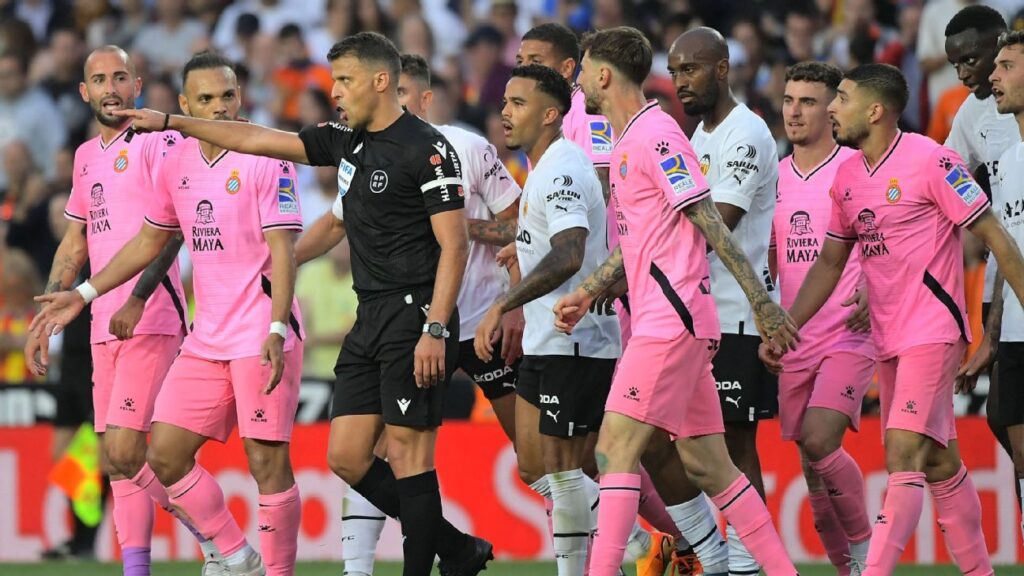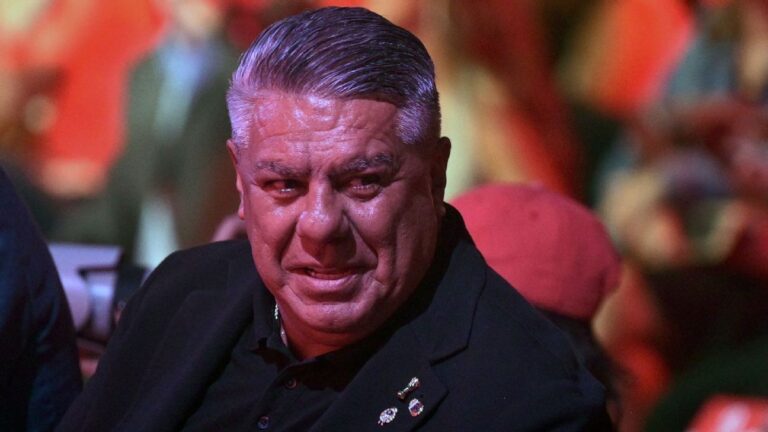That Espanyol were relegated from LaLiga at the weekend might not have had too much impact outside Barcelona, their home city, or China, where their ineffective and unloved owners reside.
If you were watching the tumultuous match at Valencia’s Mestalla stadium, where the home side’s equaliser in added time nudged Los Che away from the drop zone and, effectively, relegated Espanyol, then the sporting drama might have impacted you. And if you witnessed Espanyol’s best player, Sergi Darder, absolutely wracked with grief, sobbing his heart out, chest heaving and eyes red enough to have had chili powder rubbed in them, then perhaps the pictures of desolation will stay in the retina of your memory for quite some time.
Away from the drama of Samuel Lino’s ultra-dramatic goal in the 94th minute lies the hard fact that, for the second consecutive weekend, what happened at Mestalla highlights that Spain has a serious and urgent problem with how VAR functions and whether, right now, it is fit for purpose.
Last weekend during Valencia’s 1-0 win over Real Madrid, a valiant victory completely besmirched by the disgusting and criminal racism exhibited from start to finish, the tail end of the match saw Vinicius Junior sent off. Referee Ricardo De Burgos Bengoetxea was dealing with mayhem as a group of players verged on violence, and his colleague on VAR duty, Ignacio Iglesias Villanueva, viewed the video footage of what had happened so that he could advise the on-field ref.
– Stream on ESPN+: LaLiga, Bundesliga, more (U.S.)
So far, so simple. But Iglesias Villanueva, for whatever reason, utterly botched his job — which was to demonstrate, via video footage, the things the on-pitch referee couldn’t have seen.
He ignored and didn’t show De Burgos Bengoetxea replays of Valencia keeper Giorgi Mamardashvili racing toward Vinicius to confront him physically. He ignored and didn’t show De Burgos Bengoetxea images of Valencia striker Hugo Duro irresponsibly and violently grabbing Vinicius around the neck in a choke hold. Both instances were dangerous, against the rules and sanctionable with a red card. De Burgos Bengoetxea, when he watched the incident on screen at the side of the pitch, was shown only Vinicius lashing out at Duro and, thus, showed a red card only to Madrid’s Brazilian forward.
The immediate consequences were that a Spanish FA committee decided that Vinicius should have his red card rescinded and Iglesias Villanueva, amid well-sourced reports that he wouldn’t be allowed to work in the VAR booth again, should be removed from duty assessing the midweek match between Real Betis and Getafe. The longer-term consequences of Iglesias Villanueva’s quite inexplicable incompetence, though, could be pretty grave.
Madrid lost, and ultimately those three points dropped might even help Atletico Madrid leapfrog them into second place in LaLiga by the end of business on Sunday. That’s not the end of the world in itself, but never forget that there are millions of euros in prize money in play. Much more serious is the fact that, had either Valencia’s keeper or striker been sanctioned with the red cards their behaviour merited, it’s feasible that the suspensions might have been more than one game and, in that case, neither would have been free to play in Sunday’s 2-2 draw that, ultimately, relegated Espanyol.
Now let’s skip forward to that precise match. Valencia led 1-0, then Espanyol scored twice to dominate a contest that was their lifeline. Had Los Pericos won, then they would have avoided relegation and would have gone into the final weekend able to overtake four of the clubs above them. Salvation was at hand.
Then there were three incidents, at least two of which definitely merited the VAR officials asking the on-pitch referee to look at the action again. The other I’ll leave up to you to decide. Each of the incidents went against Espanyol and, ultimately, contributed to ensuring that the club from Barcelona were relegated.
First was when their inspirational Mexican centre-back, Cesar Montes, added to his earlier headed goal by rising in the jump with goalkeeper Mamardashvili to nod the ball into the net for what would have been 3-1 to Espanyol. The referee, Jesus Gil Manzano, appeared to have been lazy. Standing well outside the penalty area, he apparently couldn’t be bothered to sprint the five or six yards it would take him to monitor the goal from a closer angle.
The moment Valencia’s keeper is beaten to the ball, Gil Manzano blows his whistle, the picture of complacency, and disallows the goal for a foul. But there was no foul. Don’t take my word for it, take the word of one of Spain’s most high-profile ex-referees, Eduardo Iturralde Gonzalez (veteran of 349 LaLiga and Copa del Rey matches.)
Not long after the match that ended Espanyol’s time in the Primera Division, he was called to speak on Cadena SER programme “Carrusel Deportivo” about it and said: “It’s inexplicable why that goal was disallowed. When the keeper has the ball in his hands, that’s when a striker cannot compete with him, but in this instance the ball was never in the keeper’s hands. There was no foul of any kind by Montes. What I can’t understand is why VAR didn’t advise the ref about it!”
Then came the Valencia equaliser. If you saw the goal, you’ll understand.
Espanyol’s Martin Braithwaite was trying to burst forward, there was contact between him and Valencia captain Jose Gaya, and it’s a matter of opinion whether the striker was barged and fouled … or not. At any rate, Valencia picked up possession, poured forward themselves and Lino scored a smashing goal that sent the home fans absolutely wild with delight.
Again, there was no VAR intervention. Some will decide that there was no clear and obvious error by the referee; others won’t take that stance.
Finally, and this is the most egregious error, coming in the dying seconds of the match, already at 2-2 and with Espanyol desperately needing a goal to avoid being sent to the second division. Valencia’s Brazilian defender Gabriel Paulista lunges at Braithwaite, scissor tackles the Denmark international’s legs in the area, makes no contact with the ball and quite patently fouls the striker. It’s a textbook penalty.
I dare anybody to say that there wasn’t at least an open-and-shut case for the VAR booth officials to advise Gil Manzano that he needed to look at the incident again. In this crucial moment, the referee is in his same lazy spot — about 15 feet outside the penalty area — and his vision of the challenge is inadvertently blocked by Valencia’s Javi Guerra.
Arguably what we were watching was the very reason VAR was brought into football.
Correcting clear errors throughout the season, where the referee, either by failure or because of some impossible circumstance, hasn’t been able to see or understand an offence and therefore hasn’t been able to serve justice, obviously matters. The points on offer in matches from August to May are also important, so is the idea that a tool as powerful as VAR is consistently credible, helpful and reliable throughout a season.
When it comes to livelihoods, though, when it comes to a club losing millions of euros and potentially making many of its staff unemployed, that’s when we most need VAR to be pinpoint accurate, to intervene with total clarity of purpose and to ensure that there are no injustices during these two or three most dramatic and cataclysmic weekends of the season.
Those of us who watch matches via television or via video clips eventually see precisely what the officials in the VAR booth see. None of us suffer the same pressure as an on-pitch referee who’s often being asked to deal with the sporting equivalent of finding a needle in a haystack. They are surrounded by whirling dervishes, many of whom are intent on deceiving the match official, and the action, played against a cacophony of ambient noise, usually allows for mere split-second visions of the key, polemic actions via which a referee will eventually be venerated or execrated.
Not so the VAR officials. They are soundproofed in their little cubicle, they have extra seconds and usually minutes in which to use their knowledge, judgement and professional skills. Time is on their side. They can see every available angle, and all they have to do is advise the embattled official when, in extremis, they have missed something and made a bad decision in the areas where VAR is permitted to function.
Last weekend and this Sunday, each time at Mestalla, there were calamitous failures, human not technical, that led to disastrous consequences. This needs explaining. This needs to have repercussions. And this needs to be solved. Otherwise, even those of us who still regard VAR as a useful, important tool to help match officials keep pace with an ever-faster sport that is constantly under greater scrutiny, will join ranks with those who’ve already lost faith.




